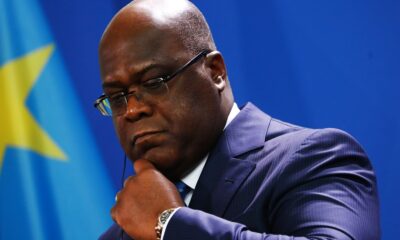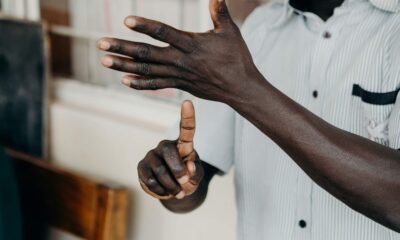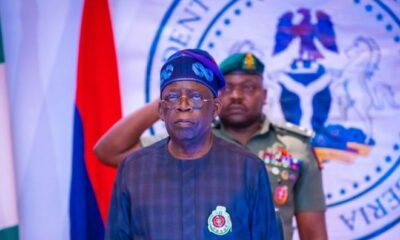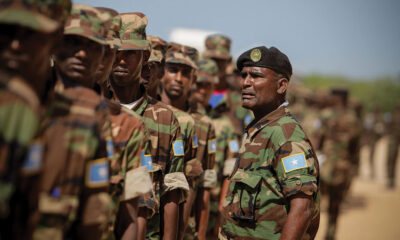Strictly Personal
UK-Rwanda relocation plan for asylum seekers is a hot potato by Charles Onyango-Obbo
Published
2 years agoon

In 2019, Rwanda agreed to take in hundreds of African immigrants held in horrid conditions in detention centres in Libya under an agreement with the UN refugee agency, UNHCR, and the African Union.
There was applause.
In August 2021, as America’s 20-year-old military and state-building campaign in Afghanistan unravelled into chaos, in Africa —Rwanda and Uganda — agreed to take in Afghanistan refugees.
Among the Afghans who relocated to Rwanda, escaping the Taliban’s well-known hostility toward education for women, were all 250 students of the famed Afghanistan Leadership School (SOLA), Afghanistan’s only boarding school for girls.
There were cheers and extravagant praise for Rwanda and Uganda. Today, Rwanda hosts nearly 140,000 refugees and asylum seekers. Uganda, on the other hand, hosts 1.5 million refugees, making it the top refugee-hosting country in Africa.
In April this year, hell broke loose. The UK announced that it had a plan to send illegal asylum seekers to Rwanda, where they would either stay or move on to other countries.
The Boris Johnson government insists the programme is aimed at disrupting people-smuggling networks and deterring migrants from making the dangerous sea journey across the English Channel to England from France.
Critics have come out swinging with fury, calling the plan immoral, racist, and several arguing it is risky because several of the human rights found in liberal democracies are absent in Rwanda. This new “democracy test” for resettlement, has opened up a tricky window into the protection business.
The UK asylum affair, meanwhile, has muscled its way into the headlines about the Commonwealth Heads of Government (Chogm) meeting being held in Kigali.
The high emotions the UK-Rwanda asylum plan has kicked up, are a pointer to how complicated, immigration and refugee have come. There are several contradictory things that are both true at the same time.
If Donald Trump’s election victory in the US in 2016, and his turbulent racist-fuelled term tell us anything, it is that the western world has reached “peak” migration.
Uncomfortable to confront, but it is probably no longer sustainable for, especially, people from the south to continue emigrating and fleeing to the West in large numbers. Domestically, the fear of people of colour “replacing” white communities is reaching a fever pitch, and fuelling extreme right-wing politics.
We’ve to grant it. The demographic make-up of the West is changing, and by the end of this century, white people will be minorities in nearly all the major European countries. Not too many people will take their disappearance with great fortitude.
For the western left and progressives, migration and the diverse nations it makes possible is where they see the future of their play in politics. For businesses, migrants provide a new pool of cheap labour, ensuring their profit in a world where China is eating their lunch. Things like the UK-Rwandan plan, do have long-term political and economic consequences.
Yet, that doesn’t explain why the resettlements of immigrants from Libya and Afghanistan in Africa weren’t attacked. The difference could be because Libya’s and Afghanistan’s crises are partly outcomes of western — NATO and the US — interventions that went horribly wrong. The repatriations are a much-needed clean-up of the mess — and there is some consensus of the western left and right on that.
Charles Onyango-Obbo is a journalist, writer, and curator of the “Wall of Great Africans”. Twitter@cobbo3
You may like
-


Air Peace, capitalism and national interest, By Dakuku Peterside
-


This is chaos, not governance, and we must stop it, By Tee Ngugi
-


Off we go again with public shows, humbug and clowning, By Jenerali Uliwengu
-


How patriarchy underpins gender violence today, By Tee Ngugi
-


Help! There’s a dangerous, secret plot to save the EAC from imminent death, By Charles Onyango-Obbo
-


How South Africa, US elections could shape Tshisekedi’s bread in Kinshasa, By Charles Onyango-Obbo
Strictly Personal
Air Peace, capitalism and national interest, By Dakuku Peterside
Published
1 week agoon
April 16, 2024
Nigerian corporate influence and that of the West continue to collide. The rationale is straightforward: whereas corporate activity in Europe and America is part of their larger local and foreign policy engagement, privately owned enterprises in Nigeria or commercial interests are not part of Nigeria’s foreign policy ecosystem, neither is there a strong culture of government support for privately owned enterprises’ expansion locally and internationally.
The relationship between Nigerian businesses and foreign policy is important to the national interest. When backing domestic Nigerian companies to compete on a worldwide scale, the government should see it as a lever to drive foreign policy, and national strategic interest, promote trade, enhance national security considerations, and minimize distortion in the domestic market as the foreign airlines were doing, boost GDP, create employment opportunities, and optimize corporate returns for the firms.
Admitted nations do not always interfere directly in their companies’ business and commercial dealings, and there are always exceptions. I can cite two areas of exception: military sales by companies because of their strategic implications and are, therefore, part of foreign and diplomatic policy and processes. The second is where the products or routes of a company have implications for foreign policy. Air Peace falls into the second category in the Lagos – London route.
Two events demonstrate an emerging trend that, if not checked, will disincentivize Nigerian firms from competing in the global marketplace. There are other notable examples, but I am using these two examples because they are very recent and ongoing, and they are typological representations of the need for Nigerian government backing and support for local companies that are playing in a very competitive international market dominated by big foreign companies whose governments are using all forms of foreign policies and diplomacy to support and sustain.
The first is Air Peace. It is the only Nigerian-owned aviation company playing globally and checkmating the dominance of foreign airlines. The most recent advance is the commencement of flights on the Lagos – London route. In Nigeria, foreign airlines are well-established and accustomed to a lack of rivalry, yet a free-market economy depends on the existence of competition. Nigeria has significantly larger airline profits per passenger than other comparable African nations. Insufficient competition has resulted in high ticket costs and poor service quality. It is precisely this jinx that Air Peace is attempting to break.
On March 30, 2024, Air Peace reciprocated the lopsided Bilateral Air Service Agreement, BASA, between Nigeria and the United Kingdom when the local airline began direct flight operations from Lagos to Gatwick Airport in London. This elicited several reactions from foreign airlines backed by their various sovereigns because of their strategic interest. A critical response is the commencement of a price war. Before the Air Peace entry, the price of international flight tickets on the Lagos-London route had soared to as much as N3.5 million for the economy ticket. However, after Air Peace introduced a return economy class ticket priced at N1.2 million, foreign carriers like British Airways, Virgin Atlantic, and Qatar Airways reduced their fares significantly to remain competitive.
In a price war, there is little the government can do. In an open-market competitive situation such as this, our government must not act in a manner that suggests it is antagonistic to foreign players and competitors. There must be an appearance of a level playing field. However, government owes Air Peace protection against foreign competitors backed by their home governments. This is in the overall interest of the Nigerian consumer of goods and services. Competition history in the airspace works where the Consumer Protection Authority in the host country is active. This is almost absent in Nigeria and it is a reason why foreign airlines have been arbitrary in pricing their tickets. Nigerian consumers are often at the mercy of these foreign firms who lack any vista of patriotism and are more inclined to protect the national interest of their governments and countries.
It would not be too much to expect Nigerian companies playing globally to benefit from the protection of the Nigerian government to limit influence peddling by foreign-owned companies. The success of Air Peace should enable a more competitive and sustainable market, allowing domestic players to grow their network and propel Nigeria to the forefront of international aviation.
The second is Proforce, a Nigerian-owned military hardware manufacturing firm active in Rwanda, Chad, Mali, Ghana, Niger, Burkina Faso, and South Sudan. Despite the growing capacity of Proforce in military hardware manufacturing, Nigeria entered two lopsided arrangements with two UAE firms to supply military equipment worth billions of dollars , respectively. Both deals are backed by the UAE government but executed by UAE firms.
These deals on a more extensive web are not unconnected with UAE’s national strategic interest. In pursuit of its strategic national interest, India is pushing Indian firms to supply military equipment to Nigeria. The Nigerian defence equipment market has seen weaker indigenous competitors driven out due to the combination of local manufacturers’ lack of competitive capacity and government patronage of Asian, European, and US firms in the defence equipment manufacturing sector. This is a misnomer and needs to be corrected.
Not only should our government be the primary customer of this firm if its products meet international standards, but it should also support and protect it from the harsh competitive realities of a challenging but strategic market directly linked to our national military procurement ecosystem. The ability to produce military hardware locally is significant to our defence strategy.
This firm and similar companies playing in this strategic defence area must be considered strategic and have a considerable place in Nigeria’s foreign policy calculations. Protecting Nigeria’s interests is the primary reason for our engagement in global diplomacy. The government must deliberately balance national interest with capacity and competence in military hardware purchases. It will not be too much to ask these foreign firms to partner with local companies so we can embed the technology transfer advantages.
Our government must create an environment that enables our local companies to compete globally and ply their trades in various countries. It should be part of the government’s overall economic, strategic growth agenda to identify areas or sectors in which Nigerian companies have a competitive advantage, especially in the sub-region and across Africa and support the companies in these sectors to advance and grow to dominate in the African region with a view to competing globally. Government support in the form of incentives such as competitive grants ,tax credit for consumers ,low-interest capital, patronage, G2G business, operational support, and diplomatic lobbying, amongst others, will alter the competitive landscape. Governments and key government agencies in the west retain the services of lobbying firms in pursuit of its strategic interest.
Nigerian firms’ competitiveness on a global scale can only be enhanced by the support of the Nigerian government. Foreign policy interests should be a key driver of Nigerian trade agreements. How does the Nigerian government support private companies to grow and compete globally? Is it intentionally mapping out growth areas and creating opportunities for Nigerian firms to maximize their potential? Is the government at the domestic level removing bottlenecks and impediments to private company growth, allowing a level playing field for these companies to compete with international companies?
Why is the government patronising foreign firms against local firms if their products are of similar value? Why are Nigerian consumers left to the hands of international companies in some sectors without the government actively supporting the growth of local firms to compete in those sectors? These questions merit honest answers. Nigerian national interest must be the driving factor for our foreign policies, which must cover the private sector, just as is the case with most developed countries. The new global capitalism is not a product of accident or chance; the government has choreographed and shaped it by using foreign policies to support and protect local firms competing globally. Nigeria must learn to do the same to build a strong economy with more jobs.
Strictly Personal
This is chaos, not governance, and we must stop it, By Tee Ngugi
Published
2 weeks agoon
April 10, 2024
The following are stories that have dominated mainstream media in recent times. Fake fertiliser and attempts by powerful politicians to kill the story. A nation of bribes, government ministries and corporations where the vice is so routine that it has the semblance of policy. Irregular spending of billions in Nairobi County.
Billions are spent in all countries on domestic and foreign travel. Grabbing of land belonging to state corporations, was a scam reminiscent of the Kanu era when even public toilets would be grabbed. Crisis in the health and education sectors.
Tribalism in hiring for state jobs. Return of construction in riparian lands and natural waterways. Relocation of major businesses because of high cost of power and heavy taxation. A tax regime that is so punitive, it squeezes life out of small businesses. Etc, ad nauseam.
To be fair, these stories of thievery, mismanagement, negligence, incompetence and greed have been present in all administrations since independence.
However, instead of the cynically-named “mama mboga” government reversing this gradual slide towards state failure, it is fuelling it.
Alternately, it’s campaigning for 2027 or gallivanting all over the world, evoking the legend of Emperor Nero playing the violin as Rome burned.
A government is run based on strict adherence to policies and laws. It appoints the most competent personnel, irrespective of tribe, to run efficient departments which have clear-cut goals.
It aligns education to its national vision. Its strategies to achieve food security should be driven by the best brains and guided by innovative policies. It enacts policies that attract investment and incentivize building of businesses. It treats any kind of thievery or negligence as sabotage.
Government is not a political party. Government officials should have nothing to do with political party matters. They should be so engaged in their government duties that they literally would not have time for party issues. Government jobs should not be used to reward girlfriends and cronies.
Government is exhausting work undertaken because of a passion to transform lives, not for the trappings of power. Government is not endless campaigning to win the next election. To his credit, Mwai Kibaki left party matters alone until he had to run for re-election.
We have corrupted the meaning of government. We have parliamentarians beholden to their tribes, not to ideas.
We have incompetent and corrupt judges. We have a civil service where you bribe to be served. Police take bribes to allow death traps on our roads. We have urban planners who plan nothing except how to line their pockets. We have regulatory agencies that regulate nothing, including the intake of their fat stomachs.
We have advisers who advise on which tenders should go to whom. There is no central organising ethos at the heart of government. There is no sense of national purpose. We have flurries of national activities, policies, legislation, appointments which don’t lead to meaningful growth. We just run on the same spot.
Tee Ngugi is a Nairobi-based political commentator
EDITOR’S PICK


Egypt reclaims 3,400-year-old stolen statue of King Ramses II
Egypt has received a 3,400-year-old statue depicting the head of King Ramses II that was stolen and smuggled out of...


Sign language interpreter, Kunda, seeks inclusivity in media rights agenda
An inclusive society is crucial for a nation’s human and economic development in the modern era. In this edition of...


Sign language interpreter, Kunda, seeks inclusivity in media rights agenda (video)
An inclusive society is crucial for a nation’s human and economic development in the modern era. In this edition of...


Educationist challenges media freedom norms, cautions against misuse of freedom of expression
Geshom Banda, Deputy Head Teacher at Hillside Primary School, presents a contrasting perspective amidst discussions on media freedom and digital...


Nigerian govt shuts Chinese supermarket over ‘no-Nigerian shopper’ allegation
Nigeria’s Federal Competition and Consumer Protection Commission has shut down a Chinese store in Abuja, the country’s capital, because it...


Nigeria: President Tinubu identifies illegal mining as source of terrorism financing
Nigeria’s President Bola Tinubu has identified illegal mining activities as a major source of terrorism financing in the country and...


Nigeria wants $2.25 billion World Bank loan
Nigeria’s Finance Minister, Wale Edun, has revealed that the country is seeking up to $2.25 billion in World Bank loans...


‘Complex, contentious,’ media enthusiast says media rights often depend on goodwill of political leadership (video)
Kitwe Press Club spokesperson, Michael Kaluba, has described the media landscape in Zambia as complex and contentious. In a conversation...


UN signs MoU with Kenya’s Konza Technopolis
The United Nations has signed a Memorandum of Understanding (MoU) with Kenya’s Konza Technopolis that will provide a wide range...


Ghana mourns as top gospel music icon Koda passes away
The Ghanaian entertainment industry has, once again, been thrown into mourning following the death of renowned gospel musician, Kofi Owusu...
Trending
-

 Behind the News2 days ago
Behind the News2 days agoBehind the News: All the backstories to our major news this week
-

 Metro2 days ago
Metro2 days agoBinance executive who escaped from Nigeria arrested in Kenya
-

 Politics1 day ago
Politics1 day agoAfrican leaders seek change in fight against terrorism at Nigerian summit
-

 Culture12 hours ago
Culture12 hours agoEgypt reclaims 3,400-year-old stolen statue of King Ramses II



1 Comment